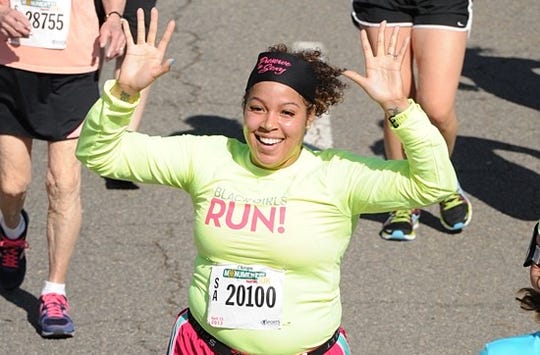For black running groups, hosting a community is key in times of stress
As states began to lift restrictions due to COVID-19, Edward Walton believed that his group, Black Men Run, could soon resume meetings. But after George Floyd's brutal killing in Minneapolis and continued protests across the country over the past week, that, too, was put on hold.
Though Wednesday is Global Running Day, Black Men Run won't officially sanction any events. But Walton understands that many of the national organization's members will want to use the day to show solidarity or to raise awareness for social issues that are impacting the black community.
Like Black Men Run, Black Girls Run is a national organization dedicated to promoting physical and mental health through running. But these organizations are more than that — they also provide a community for their members that is perhaps more vital now than ever, leaders say.
Both groups have felt the need for connecting their members after recent killings of unarmed black people whose deaths have raised questioning, sadness and outrage around the country. On Feb. 23 Ahmaud Arbery was shot and killed as he was jogging about two miles from his home in a neighborhood near Brunswick, Georgia. Two men were arrested May 7 on murder and aggravated assault charges, but not until after the incident had gained national attention. On May 8, which would have been Arbery's 26th birthday, runners across the nati ran 2.23 miles in his honor and used the hashtag #IRunWithMaud.
"Our community provides a sisterhood," Jay Ell Alexander, the owner and CEO of Black Girls Run, told USA TODAY in a phone interview Tuesday. "So I think even in light of all the situations that have been going on, people have been finding even more solace and even more need to join the community, whether it’s that connection with the sisterhood or just wanting an outlet in terms of having some type of physical activity to release that stress."
Black Girls Run owner and CEO Jay Ell Alexander has helped provide a sense of community to runners during these times of social distancing and stay-at-home restrictions. (Photo: Courtesy: Jay Ell Alexander)
When the pandemic hit in March, both organizations suspended all in-person events and replaced them with virtual challenges, fitness classes and group online meetings. In honor of Global Running Day, Black Girls Run has been hosting a six-week virtual challenge and asked its members to pledge to run a certain amount of miles Wednesday. It also plans to soon announce an event to raise money for the NAACP.
Meanwhile, Black Men Run has put an emphasis on mental health and brotherhood. Walton has arranged for virtual town halls with doctors and mental health experts as speakers, and members of the organization's 50-plus local groups meet through social media. Walton shares his phone number with everyone to give members a place to vent they may not find elsewhere.
Related: Medical examiner and family-commissioned autopsy agree: George Floyd's death was a homicide
"We are here as a support system by controlling the things that we can," said Walton, a co-founder of Black Men Run. "Take control of your mental health. … It takes a mindset to want to go out and run 15-20 miles, right? So I tell people, run on that same type of fortitude and mental makeup that allows you to go out and run all those miles by yourself, so that you can sustain yourself while all this craziness is going on."
The COVID-19 shutdown has led to a myriad of challenges for both organizations, from the urgency of moving everything virtual to deciding when it's safe to host in-person events again. Knowing the risks that come with COVID-19, Walton and Alexander say they have been cautious. Still, they push the importance of continuing to run and to raise awareness for the prevalence of the virus among black Americans especially. Black Americans have died from coronavirus at much higher rates than other Americans in major cities.
Walton contracted COVID-19 back in March, but said he was not seriously ill. In conversations with local leaders, called "captains," he's found that so far, there have been no COVID-19 fatalities in any of Black Men Run's groups.
"There were no fatalities from our active members because we chose to do something in advance and this validated why our organization was needed," Walton said. " … I hope this brings awareness that there’s no genetic inferiority among our people. This virus … attacks and kills people that are at the fringe because they don’t get access to the same type of diet, the education, the health care, the mental health."
What started as two groups to combat the lack of diversity in running and encourage black Americans to take control of their health has become much more. Now, Black Men Run and Black Girls Run have become communities where runners can express their feelings and make themselves heard — whether through pledging miles, discussing issues with fellow members or simply taking their emotions out on the pavement.
Source: Read Full Article
